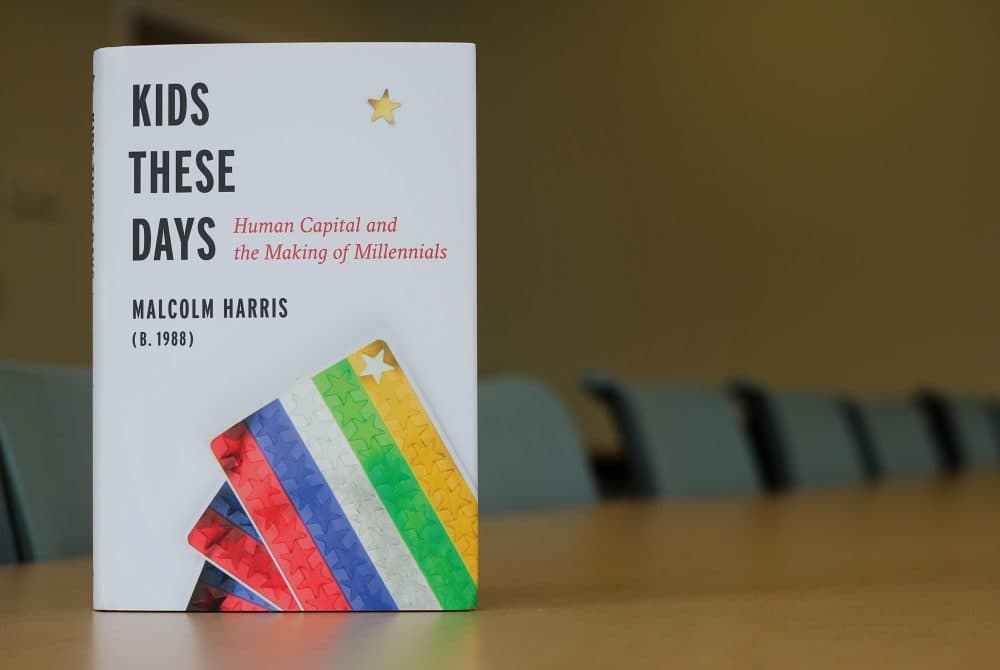Advertisement
Review
'Kids These Days' Convinces You That Millennials Aren't Ruining Everything

The conventional wisdom about millennials is not flattering. They’re narcissists. They can’t talk to one another. They’re destroying hoards of industries, from beer to casual dining to bar soap. Nothing is safe from the young cultural revolutionaries, remaking the world as they see fit. It’s an attractive story, the belief that the young are using the leavening power of the free market to chart their own course. If only it were true.
Instead, as Malcolm Harris, an editor for The New Inquiry and an early Occupy Wall Street protester, writes in his smart and provocative debut book, "Kids These Days," the millennials are experiencing something like the opposite. “If Millennials are different in one way or another, it’s not because we’re more or less evolved than our parents or grandparents,” Harris writes in the book’s introduction, “it’s because they’ve changed the world in ways that have produced people like us.” From here, he steers through many of the defining elements of American life, from how people are schooled to how they work to how they’re jailed.
The foundation of his argument is that the children of the present and recent past are treated by “industry and the government” not as people but “as investments, productive machinery, ‘human capital.’ ” This pervades all facets of their upbringing, leading to major problem every step of the way.
In this context, childhood is not a time for learning or growing, but training. In elementary and high school, for example, despite having access to technology that should reduce the amount of time required to complete work, Harris cites one study showing a threefold increase in time spent studying for 6- and 8-year-olds. Another study shows that kids spend very little time doing things they enjoy, like “self-directed play with their friends and eating” and more time doing things that make them “especially unhappy” like schoolwork. Or, he notes that between 1974 and 2014, inflation-adjusted college pricing has increased 197 percent at private schools and 280 percent at public ones, which means that more students will need to take out loans to attend, which means that the loan agencies (mostly the federal government) will make more money off of repayment. It’s no doubt controversial to reframe higher education as a money-making scheme for the government, but when diagnosing an issue, Harris first asks, “Who profits?” and his answers are convincing.
The book’s structure reflects an awareness that some segment of the population will need convincing. Each chapter centers around one subject, like school, work or entertainment, and is from there broken up into many subsections where Harris gets into the specifics that create broader illnesses. His research is rigorous and the text can get dense at times as a result, but he’s also a clear deliberate explainer, which makes it easy to understand.

Harris is a committed leftist and a gifted polemicist with a smart-aleck bent. His views of the cultural problems that define the millennial generation grow out of his vision for a better society, one where labor earns a much higher share of national production, inequality is lower and kids are treated like kids instead of pre-workers. Those who don’t share that vision will find a lot to grapple with in this book but not a lot to like.
The toughest part of the book to swallow is its bleak conclusion. Summing up the lessons of the evidence he’s presented throughout the book, he writes:
Profits are up, labor costs are down; unions are on their back feet and workers are more productive; there’s more inequality, and more jails to house people from the wrong side in case they get any bright ideas. The institutions that sort American children don’t necessarily care who wins and who loses — anyone can technically climb from the bottom to the top of the national caste system, and it’s possible to fall from the top to bottom, but the number of podium spots is determined by larger forces than individual effort or merit.
The sum total of "Kids These Days" is not a hopeful sentiment, and Harris is aware. Yet at the end, when most writers of largely-depressing books offer solutions to the problems they’ve described, Harris does the opposite.
In a section called “Bop-It Solutions,” named after a plastic toy that instructed its user to perform a series of mechanical actions with it, he lists what he sees as the available means of mending society and why he believes they’re doomed to fail. Unfortunately, this section is convincing too.
It’s admirable that he peddles no false hope but the shot stings worse with no chaser. His most reassuring idea is this: Millennials will “become fascists or revolutionaries, one or the other.” Perhaps if millennials truly remake the world in their best image, as some of the more sensational reporting suggests, the crisis will be averted.